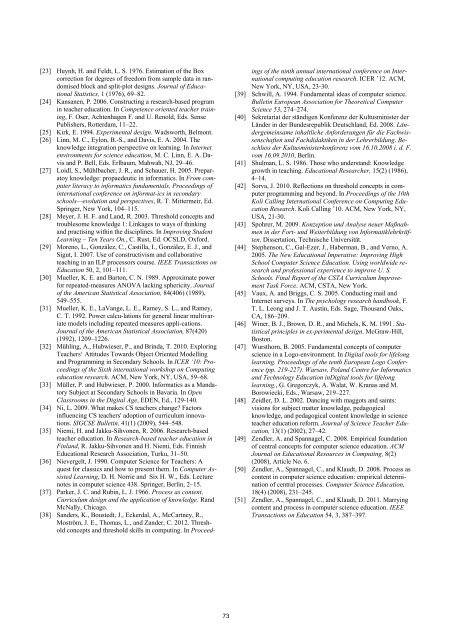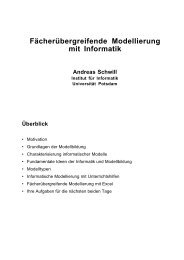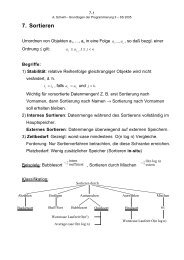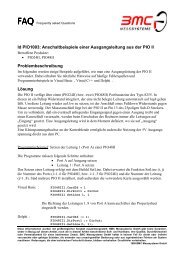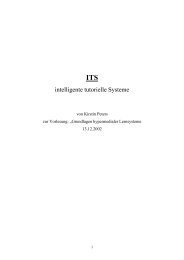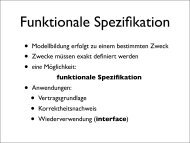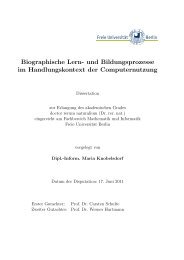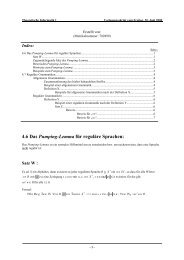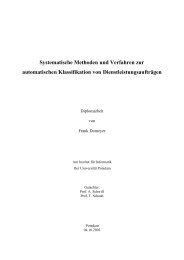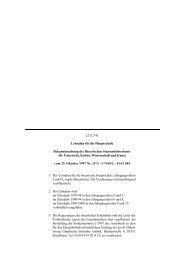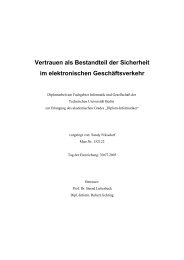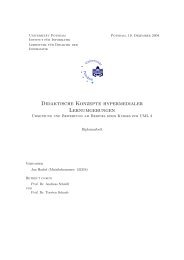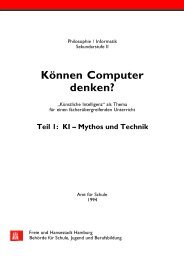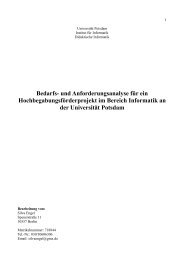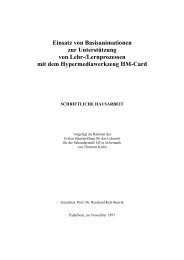Maria Knobelsdorf, University of Dortmund, Germany - Didaktik der ...
Maria Knobelsdorf, University of Dortmund, Germany - Didaktik der ...
Maria Knobelsdorf, University of Dortmund, Germany - Didaktik der ...
Create successful ePaper yourself
Turn your PDF publications into a flip-book with our unique Google optimized e-Paper software.
[23] Huynh, H. and Feldt, L. S. 1976. Estimation <strong>of</strong> the Box<br />
correction for degrees <strong>of</strong> freedom from sample data in randomised<br />
block and split-plot designs. Journal <strong>of</strong> Educational<br />
Statistics, 1 (1976), 69–82.<br />
[24] Kansanen, P. 2006. Constructing a research-based program<br />
in teacher education. In Competence oriented teacher training,<br />
F. Oser, Achtenhagen F. and U. Renold, Eds. Sense<br />
Publishers, Rotterdam, 11–22.<br />
[25] Kirk, E. 1994. Experimental design. Wadsworth, Belmont.<br />
[26] Linn, M. C., Eylon, B.-S., and Davis, E. A. 2004. The<br />
knowledge integration perspective on learning. In Internet<br />
environments for science education, M. C. Linn, E. A. Davis<br />
and P. Bell, Eds. Erlbaum, Mahwah, NJ, 29–46.<br />
[27] Loidl, S., Mühlbacher, J. R., and Schauer, H. 2005. Preparatoy<br />
knowledge: propaedeutic in informatics. In From computer<br />
literacy to informatics fundamentals, Proceedings <strong>of</strong><br />
international conference on informat-ics in secondary<br />
schools—evolution and perspectives, R. T. Mittermeir, Ed.<br />
Springer, New York, 104–115.<br />
[28] Meyer, J. H. F. and Land, R. 2003. Threshold concepts and<br />
troublesome knowledge 1: Linkages to ways <strong>of</strong> thinking<br />
and practising within the disciplines. In Improving Student<br />
Learning – Ten Years On., C. Rust, Ed. OCSLD, Oxford.<br />
[29] Moreno, L., González, C., Castilla, I., González, E. J., and<br />
Sigut, I. 2007. Use <strong>of</strong> constructivism and collaborative<br />
teaching in an ILP processors course. IEEE Transactions on<br />
Education 50, 2, 101–111.<br />
[30] Mueller, K. E. and Barton, C. N. 1989. Approximate power<br />
for repeated-measures ANOVA lacking sphericity. Journal<br />
<strong>of</strong> the American Statistical Association, 84(406) (1989),<br />
549–555.<br />
[31] Mueller, K. E., LaVange, L. E., Ramey, S. L., and Ramey,<br />
C. T. 1992. Power calcu-lations for general linear multivariate<br />
models including repeated measures appli-cations.<br />
Journal <strong>of</strong> the American Statistical Association, 87(420)<br />
(1992), 1209–1226.<br />
[32] Mühling, A., Hubwieser, P., and Brinda, T. 2010. Exploring<br />
Teachers‘ Attitudes Towards Object Oriented Modelling<br />
and Programming in Secondary Schools. In ICER ‘10: Proceedings<br />
<strong>of</strong> the Sixth international workshop on Computing<br />
education research. ACM, New York, NY, USA, 59–68.<br />
[33] Müller, P. and Hubwieser, P. 2000. Informatics as a Mandatory<br />
Subject at Secondary Schools in Bavaria. In Open<br />
Classrooms in the Digital Age, EDEN, Ed., 129‐140.<br />
[34] Ni, L. 2009. What makes CS teachers change? Factors<br />
influencing CS teachers' adoption <strong>of</strong> curriculum innovations.<br />
SIGCSE Bulletin, 41(1) (2009), 544–548.<br />
[35] Niemi, H. and Jakku-Sihvonen, R. 2006. Research-based<br />
teacher education. In Research-based teacher education in<br />
Finland, R. Jakku-Sihvonen and H. Niemi, Eds. Finnish<br />
Educational Research Association, Turku, 31–50.<br />
[36] Nievergelt, J. 1990. Computer Science for Teachers: A<br />
quest for classics and how to present them. In Computer Assisted<br />
Learning, D. H. Norrie and Six H. W., Eds. Lecture<br />
notes in computer science 438. Springer, Berlin, 2–15.<br />
[37] Parker, J. C. and Rubin, L. J. 1966. Process as content.<br />
Curriculum design and the application <strong>of</strong> knowledge. Rand<br />
McNally, Chicago.<br />
[38] San<strong>der</strong>s, K., Boustedt, J., Eckerdal, A., McCartney, R.,<br />
Moström, J. E., Thomas, L., and Zan<strong>der</strong>, C. 2012. Threshold<br />
concepts and threshold skills in computing. In Proceed-<br />
73<br />
ings <strong>of</strong> the ninth annual international conference on International<br />
computing education research. ICER ’12. ACM,<br />
New York, NY, USA, 23‐30.<br />
[39] Schwill, A. 1994. Fundamental ideas <strong>of</strong> computer science.<br />
Bulletin European Association for Theoretical Computer<br />
Science 53, 274–274.<br />
[40] Sekretariat <strong>der</strong> ständigen Konferenz <strong>der</strong> Kultusminister <strong>der</strong><br />
Län<strong>der</strong> in <strong>der</strong> Bundesrepublik Deutschland, Ed. 2008. Län<strong>der</strong>gemeinsame<br />
inhaltliche Anfor<strong>der</strong>ungen für die Fachwissenschaften<br />
und Fachdidaktiken in <strong>der</strong> Lehrerbildung. Beschluss<br />
<strong>der</strong> Kultusministerkonferenz vom 16.10.2008 i. d. F.<br />
vom 16.09.2010, Berlin.<br />
[41] Shulman, L. S. 1986. Those who un<strong>der</strong>stand: Knowledge<br />
growth in teaching. Educational Researcher, 15(2) (1986),<br />
4–14.<br />
[42] Sorva, J. 2010. Reflections on threshold concepts in computer<br />
programming and beyond. In Proceedings <strong>of</strong> the 10th<br />
Koli Calling International Conference on Computing Education<br />
Research. Koli Calling ’10. ACM, New York, NY,<br />
USA, 21‐30.<br />
[43] Spohrer, M. 2009. Konzeption und Analyse neuer Maßnahmen<br />
in <strong>der</strong> Fort- und Weiterbildung von Informatiklehrkräften.<br />
Dissertation, Technische Universität.<br />
[44] Stephenson, C., Gal-Ezer, J., Haberman, B., and Verno, A.<br />
2005. The New Educational Imperative: Improving High<br />
School Computer Science Education. Using worldwide research<br />
and pr<strong>of</strong>essional experience to improve U. S.<br />
Schools. Final Report <strong>of</strong> the CSTA Curriculum Improvement<br />
Task Force. ACM, CSTA, New York.<br />
[45] Vaux, A. and Briggs, C. S. 2005. Conducting mail and<br />
Internet surveys. In The psychology research handbook, F.<br />
T. L. Leong and J. T. Austin, Eds. Sage, Thousand Oaks,<br />
CA, 186–209.<br />
[46] Winer, B. J., Brown, D. R., and Michels, K. M. 1991. Statistical<br />
principles in ex-perimental design. McGraw-Hill,<br />
Boston.<br />
[47] Wursthorn, B. 2005. Fundamental concepts <strong>of</strong> computer<br />
science in a Logo-environment. In Digital tools for lifelong<br />
learning. Proceedings <strong>of</strong> the tenth European Logo Conference<br />
(pp. 219-227). Warsaw, Poland Centre for Informatics<br />
and Technology Education inDigital tools for lifelong<br />
learning., G. Gregorczyk, A. Walat, W. Kranas and M.<br />
Borowiecki, Eds., Warsaw, 219–227.<br />
[48] Zeidler, D. L. 2002. Dancing with maggots and saints:<br />
visions for subject matter knowledge, pedagogical<br />
knowledge, and pedagogical content knowledge in science<br />
teacher education reform. Journal <strong>of</strong> Science Teacher Education,<br />
13(1) (2002), 27–42.<br />
[49] Zendler, A. and Spannagel, C. 2008. Empirical foundation<br />
<strong>of</strong> central concepts for computer science education. ACM<br />
Journal on Educational Resources in Computing, 8(2)<br />
(2008), Article No. 6.<br />
[50] Zendler, A., Spannagel, C., and Klaudt, D. 2008. Process as<br />
content in computer science education: empirical determination<br />
<strong>of</strong> central processes. Computer Science Education,<br />
18(4) (2008), 231–245.<br />
[51] Zendler, A., Spannagel, C., and Klaudt, D. 2011. Marrying<br />
content and process in computer science education. IEEE<br />
Transactions on Education 54, 3, 387–397.


